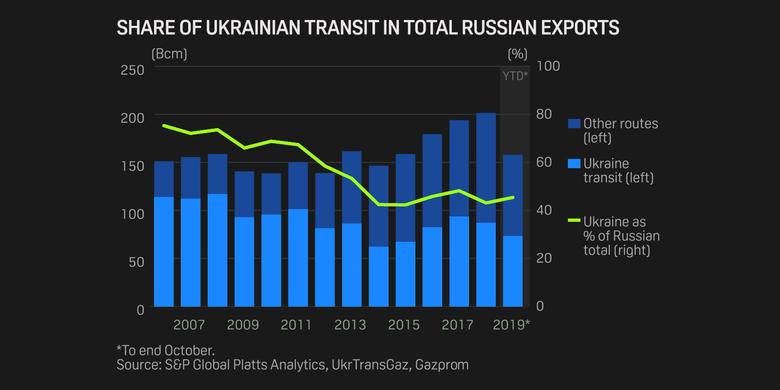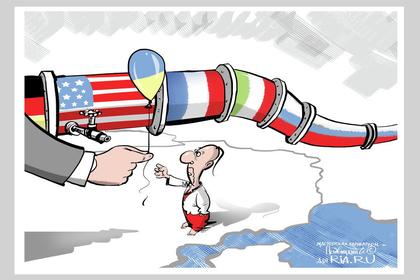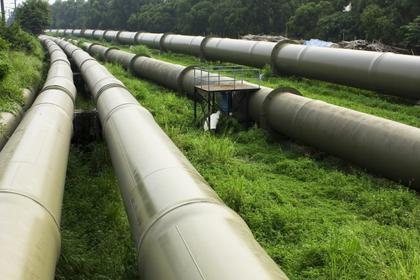
RUSSIA'S GAS FOR EUROPE: RISK

PLATTS - Russian President Vladimir Putin said late Thursday there was a risk of Russian gas transit via Ukraine to Europe being disrupted in 2020 due to possible delays in Kiev implementing its planned regulatory reforms in the gas sector.
Putin said Moscow was willing to work with Kiev both on transit and on direct gas supplies to Ukraine, according to a transcript of a Q&A with reporters in Brasilia posted to the Kremlin website.
The current 10-year agreement between Russian state-controlled Gazprom and Ukraine's state-owned Naftogaz expires at the end of 2019, and there is concern that without a new deal to take effect from January 1, Russian gas transit to Europe via Ukraine could be disrupted.
Putin said Ukraine still had work to do to align its gas regulatory landscape with that of Europe, questioning whether Kiev would be able to achieve this in time.
"That is not up to us," he said. "Therefore, the risk of termination of transit exists."
REGULATORY REFORM
Gazprom has repeatedly warned that work to reform the regulatory framework around Ukrainian gas transit may not be completed by the end of the year, meaning an extension of the current arrangements would be the only way for transit to continue in 2020.
Ukraine, which has been aiming to adopt European energy regulations to make sure any new deal with Gazprom complies, has ruled out extending the current arrangements.
Part of the reform process includes establishing a new gas grid operator unbundled from Naftogaz -- which would be the counterparty to Gazprom in any new deal -- and a new independent Ukrainian regulator.
Ukraine's parliament at the end of October approved the latest phase of unbundling of Naftogaz, which paves the way for the creation and full certification of an independent gas grid operator from December 1.
Ukraine transited some 87 Bcm of Russian gas to Europe in 2018, but those volumes are set to slump once the planned Nord Stream 2 and TurkStream gas pipelines come online.
In the first 10 months of this year, Ukraine transited 73.3 Bcm of Russian gas to Europe, or around 45% of total Russian sales in Europe and Turkey, according to data from UkrTransGaz.
Putin added that Ukraine's move to claim more compensation from Gazprom in the Stockholm arbitration court over transit was "making the situation worse."
Naftogaz filed a new claim to the Stockholm court at the end of October, seeking $12 billion in compensation from Gazprom for its refusal to accept market-based gas transit tariffs in 2018 and 2019.
Gazprom has said it would not agree a new transit deal with Naftogaz unless the numerous legal cases between the parties are resolved.
DIRECT SALES
Putin also said Moscow wanted to resume direct gas sales to Ukraine -- and would be prepared to reduce the price to Ukraine by 20%-25%.
"I believe that this is in the interests of the citizens of Ukraine," Putin said.
Ukraine suspended direct imports of Russian gas in November 2015, instead focusing on its own production and European gas imports to meet its demand.
Gazprom now wants to resume direct sales to what was once one of its biggest markets, and has linked the issue to future transit by saying it would keep part of its network close to Ukraine operational if gas supplies are needed to Ukraine itself.
Kiev, though, has repeatedly ruled out buying gas directly from Gazprom, saying it could never be depended on as a reliable supplier.
Naftogaz commercial director Yuriy Vitrenko said Friday Putin's offer to lower gas prices for Ukraine by 20%-25% was not impressive enough for Ukraine to drop the total $22 billion in legal claims made against Gazprom.
Vitrenko said Russian gas delivered to Ukraine by definition had to be cheaper because transportation costs are much lower and the more gas Gazprom delivers to Ukraine, the less gas will be delivered to Europe, reducing Ukraine's gas transit revenues.
"20%-25% is not a discount -- it is a normal price that will result in a fall in Ukraine's revenue from gas transit," Vitrenko said.
He added that the discount was also not enough to compensate for the net $2.56 billion arbitration award to Naftogaz.
Instead, Vitrenko urged European regulators to force Gazprom to let European traders buy Russian gas at the border between Russia and Ukraine, which would help maintain healthy transit volumes via Ukrainian pipelines.
-----
Earlier:












